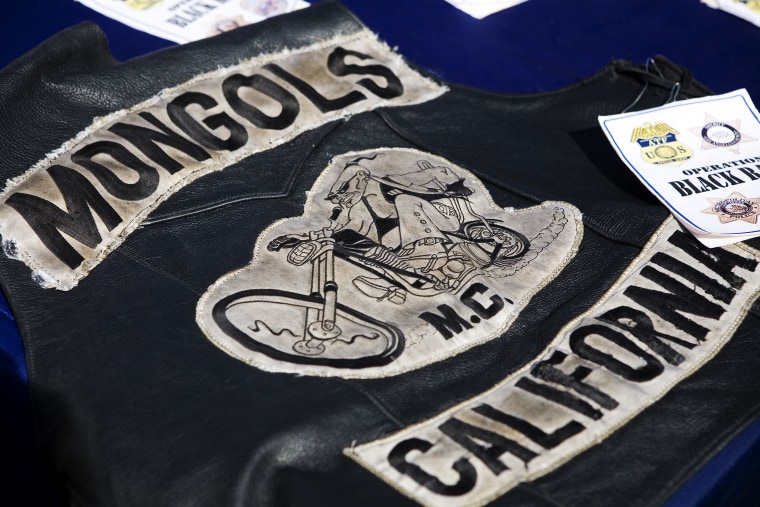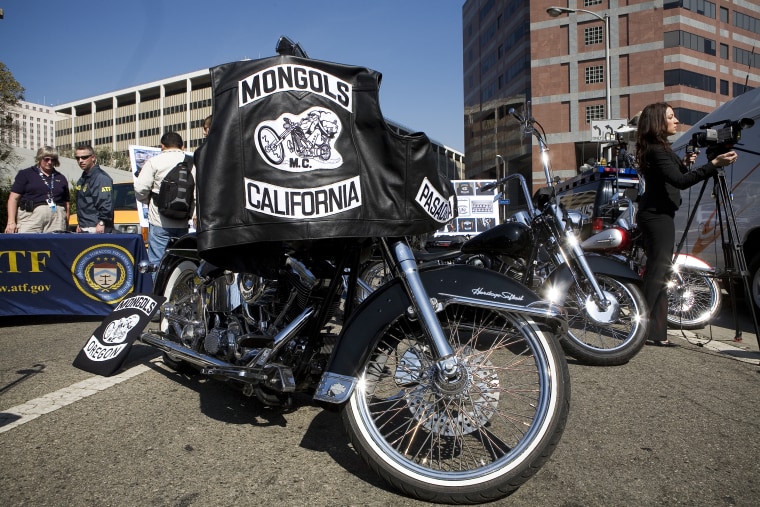The feds have called the Mongol Nation "the most violent and dangerous" biker gang in the country, and they're trying an unusual tactic to dismantle them: Stripping them of the trademarked patches that are prized by members and feared by rivals.
A racketeering trial is set to begin in Santa Ana, California, later this week — opening arguments begin Wednesday — in which prosecutors accuse Mongol Nation of operating as an organized criminal enterprise involved in murder, attempted murder, assault, drug-dealing and more.
And prosecutors want to force the organization to forfeit "any and all marks" that include the organization's logo — the word "Mongols" and a drawing of a Genghis Khan-styled rider on a motorcycle.
That caricature is serious business for the Mongols, court papers say.
Higher-ups in the estimated 600-person gang "will frequently bear patches that indicate that they are officers in the enterprise," and they earn those patches through violence and mayhem, prosecutors say.
"The Mongols Gang is a violent, drug trafficking organization that advocates and rewards its members and associates for committing violent crimes, including, and specifically, assaults and murders, on behalf of the gang and in order to promote what the gang terms 'respect,' prosecutors wrote in one court filing.
In another filing, they said the club's "'Mother Chapter' may award a specific Mongols member a 'skull and crossbones' or 'Respect Few Fear None' patch to those members who have committed murder or engaged acts of violence on behalf of the Mongols."
The U.S. Attorney's Office for California's Central District has been trying to go after the patches for a decade. Then-U.S. Attorney Thomas O'Brien first announced the unusual legal bid after 79 members of the gang were indicted in 2008.
“If the court grants our request ... then if any law enforcement officer sees a Mongol wearing his patch, he will be authorized to stop that gang member and literally take the jacket right off his back," O'Brien said at the time, according to a McClatchy report.

But that bid and a later one got shot down in court. A federal appeals court gave prosecutors the green light to try again last year.
Opening arguments are is set to begin for the expected eight week trial on Wednesday. Prosecutors say they expect to call 96 witnesses detailing the gang's criminal history.
Defense lawyers say the motorcycle group is simply a loose configuration of riders in the Southwest, not an organized criminal enterprise. They also maintain that the government doesn't have the right to seize the patches of members who haven't been involved in any criminal activity.
In court filings, the group's lawyers say they plan to call former Minnesota governor Jesse Ventura as an expert witness on the group and its history. Ventura — also a former professional wrestler and actor — was a member of the the group in the 1970s.
Defense lawyers also want to call journalist Lisa Ling, who interviewed the group for a CNN documentary in 2015, to testify about the "organization and structure of the club."
The government has objected to both Ventura and Ling being called as witnesses, saying neither is an expert.
CORRECTION (Oct. 31, 2018, 5 p.m. ET): An earlier version of this article misstated the timeline for the trial in the Mongol case. Wednesday was the day for opening arguments in the case, not for jury selection, which began earlier.

